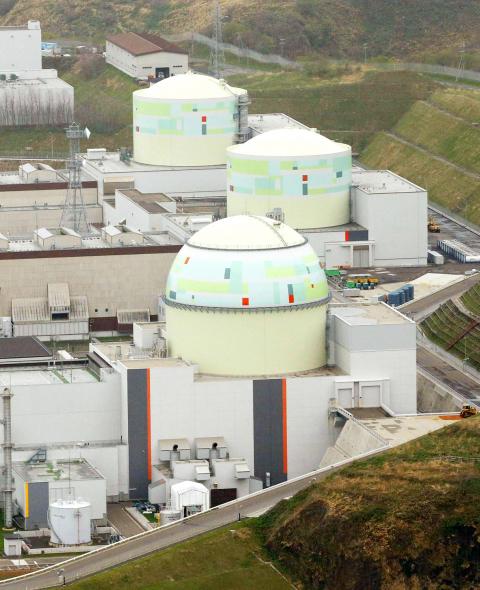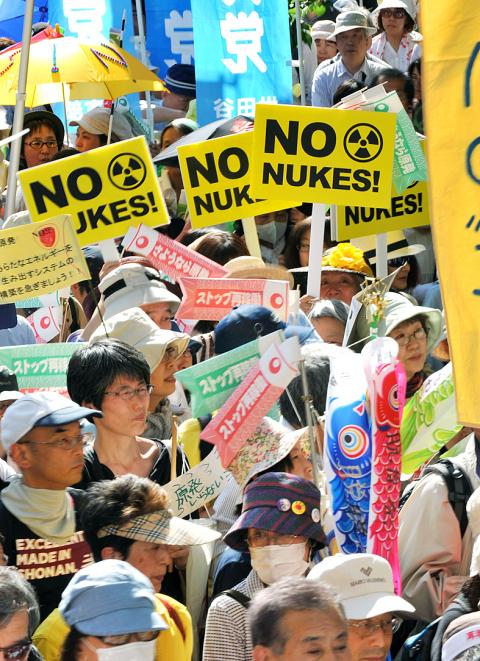A Japanese power firm began switching off the country’s last working reactor, leaving it without nuclear power just over a year after the world’s worst atomic accident in a quarter of a century.
As technicians close down the No. 3 unit at Tomari in Hokkaido, the debate over whether Japan needs nuclear power has been reignited, amid increasingly shrill warnings of summer power blackouts.
Hokkaido Electric Power, which runs the plant, said they started inserting control rods at 5pm that would halt the chain reaction and bring the reactor to “cold shutdown” sometime on Monday.

Photo: Reuters
“Power output started declining at the No. 3 unit,” said Tomohiko Shibuya, a Hokkaido Electric Power spokesman. “We have not heard of any trouble so far. Power generation there is scheduled to stop completely in about six hours.”
The shuttering will mark the first time since the 1970s that resource-poor and energy-hungry Japan has been without nuclear power, a technology that had provided a third of its electricity until meltdowns at the Fukushima Dai-ichi nuclear power plant after the earthquake and tsunami disaster in March last year.
“A new [era in] Japan with no nuclear power has begun,” said Gyoshu Otsu, a 56-year-old monk who joined a protest against nuclear power in front of the industry ministry in Tokyo which supervises the nation’s power utilities.

Photo: AFP
“Generating nuclear power is like a criminal act as a lot of people are still suffering,” said Otsu, wearing white Buddhist clothes.
“If we allow the situation as it is now, another accident will occur,” he added.
Protest organiser Masao Kimura said: “It’s a symbolic day today. Now we can prove that we will be able to live without nuclear power.”
Separately, about 5,500 demonstrators staged a rally at a park near Tokyo Tower and later marched through central Tokyo carrying banners which read: “Sayonara [Goodbye], nuclear power.”
“We have to take action now, so that Fukushima should be the last nuclear accident not only in Japan, but all over the world,” Mizuho Fukushima, head of the opposition Social Democratic Party, said during the rally.
When power generation stopped late yesterday, Japan’s entire stable of 50 reactors would be offline, despite increasingly urgent calls from the power industry and bodies like the Organisation for Economic Cooperation and Development, who fear dire consequences for the world’s third-largest economy.
Last month, Kansai Electric Power, which supplies mid-western Japan, including the commercial hubs of Osaka, Kyoto and Kobe, said a hot summer could see supply fall nearly 20 percent short of demand.
Kyushu Electric Power, covering an area further west, and Hokkaido Electric Power also said they would struggle as air conditioning gets cranked up in Japan’s sweltering summer.

A magnitude 7.0 earthquake struck off Yilan at 11:05pm yesterday, the Central Weather Administration (CWA) said. The epicenter was located at sea, about 32.3km east of Yilan County Hall, at a depth of 72.8km, CWA data showed There were no immediate reports of damage. The intensity of the quake, which gauges the actual effect of a seismic event, measured 4 in Yilan County area on Taiwan’s seven-tier intensity scale, the data showed. It measured 4 in other parts of eastern, northern and central Taiwan as well as Tainan, and 3 in Kaohsiung and Pingtung County, and 2 in Lienchiang and Penghu counties and 1

FOREIGN INTERFERENCE: Beijing would likely intensify public opinion warfare in next year’s local elections to prevent Lai from getting re-elected, the ‘Yomiuri Shimbun’ said Internal documents from a Chinese artificial intelligence (AI) company indicated that China has been using the technology to intervene in foreign elections, including propaganda targeting Taiwan’s local elections next year and presidential elections in 2028, a Japanese newspaper reported yesterday. The Institute of National Security of Vanderbilt University obtained nearly 400 pages of documents from GoLaxy, a company with ties to the Chinese government, and found evidence that it had apparently deployed sophisticated, AI-driven propaganda campaigns in Hong Kong and Taiwan to shape public opinion, the Yomiuri Shimbun reported. GoLaxy provides insights, situation analysis and public opinion-shaping technology by conducting network surveillance

‘POLITICAL GAME’: DPP lawmakers said the motion would not meet the legislative threshold needed, and accused the KMT and the TPP of trivializing the Constitution The Legislative Yuan yesterday approved a motion to initiate impeachment proceedings against President William Lai (賴清德), saying he had undermined Taiwan’s constitutional order and democracy. The motion was approved 61-50 by lawmakers from the main opposition Chinese Nationalist Party (KMT) and the smaller Taiwan People’s Party (TPP), who together hold a legislative majority. Under the motion, a roll call vote for impeachment would be held on May 19 next year, after various hearings are held and Lai is given the chance to defend himself. The move came after Lai on Monday last week did not promulgate an amendment passed by the legislature that

Taiwan is gearing up to celebrate the New Year at events across the country, headlined by the annual countdown and Taipei 101 fireworks display at midnight. Many of the events are to be livesteamed online. See below for lineups and links: Taipei Taipei’s New Year’s Party 2026 is to begin at 7pm and run until 1am, with the theme “Sailing to the Future.” South Korean girl group KARA is headlining the concert at Taipei City Hall Plaza, with additional performances by Amber An (安心亞), Nick Chou (周湯豪), hip-hop trio Nine One One (玖壹壹), Bii (畢書盡), girl group Genblue (幻藍小熊) and more. The festivities are to